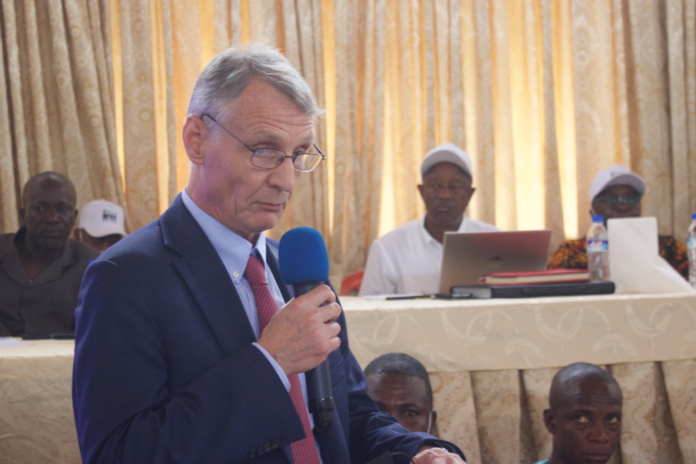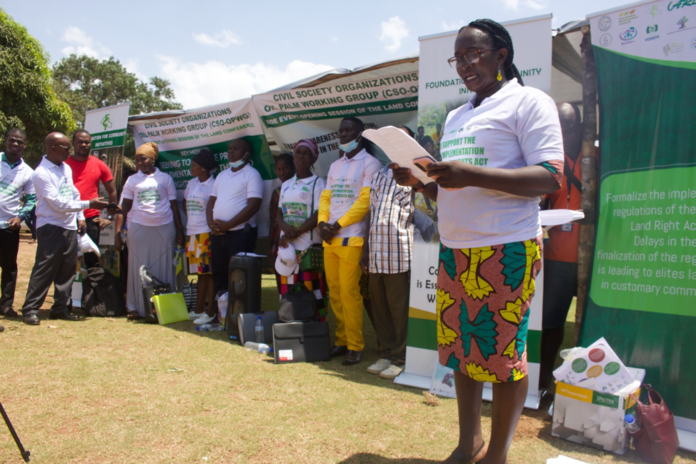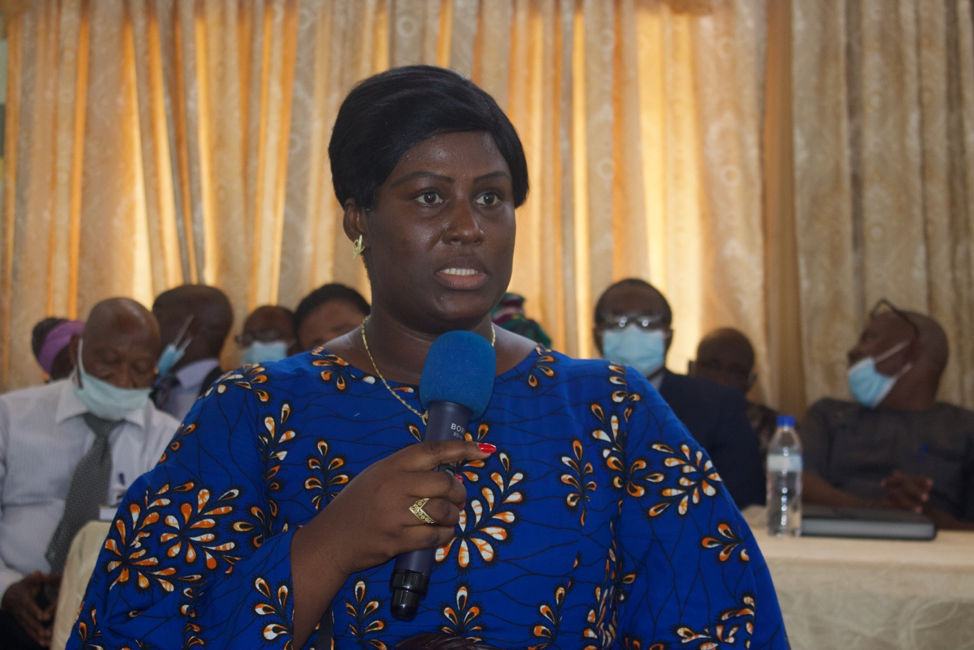Top: USAID Mission Director Jim Wright speaks at the launch of Land Management Activity on the second day of the National Land Conference in Buchanan, Grand Bassa County on March 2, 2022. The DayLight/James Harding Giahyue
By James Harding Giahyue
BUCHANAN, Grand Bassa County – Jim Wright, the Mission Director of the United States Agency for International Development (USAID), has urged players in the land sector to continue to support rural communities formalizing the right to their land.
Wright spoke on Wednesday when USAID launched the Land Management Activity (LMA), a US$10 million project whose aim is to support 100 customary communities to legalize their ancestral land.
“I urge all stakeholders in the land space to remain engaged and assist communities to harvest the benefits that come with secure land tenure rights,” Wright told over 165 delegates of the National Land Conference while launching the four-year scheme. “I also encourage communities to not only become deed holders but to also utilize those deeds to transform their lives and those of their children and grandchildren.”
Liberia’s Land Rights Act guarantees customary land ownership and women’s rights. Under the law, towns and villages must first identify themselves as a single landowning community, demarcate their boundaries with neighboring areas and create a governance body, among other things. After that, the Liberia Land Authority conducts a survey to confirm the community’s landmass and awards it a deed.
However, implementation of the law has been a challenge, with many communities across the country yet to begin or complete the legal requirements in the law.
Wright said the LMA, which replaces the Land Governance Support Activity that ended in 2020, will support the Land Authority to guide the communities as they go through the legal process to acquire their ancestral deeds.
“Securing customary land rights is critical to strengthening Liberia’s democracy, sustaining peace, promoting economic growth and the sustainable management of land and environmental resources, and empowering women, youth and marginalized populations,” he said.
Bloh Sayeh, Commissioner of the Land Authority, praised the United States for its support, citing historical ties dating as far back as the formation of Liberia in the 1820s.
ECODIT, an international nongovernmental organization, is working with Tetra Tech, another international NGO, and three Liberian civil society organizations to implement the LMA project. The organizations are the Sustainable Development Institute (SDI), Rights and Rice Foundation (RRF) and Talking Drum Studio. It targets communities in Nimba, Lofa, Bong, Margibi, Grand Bassa and Montserrado.
ECODIT’s Chief of Party Kadidia Dienta told delegates at the conference that the LMA project would also support communities plan the use of their land, see to it women, youth and other marginalized groups participate in land governance and management, promote the use of alternative dispute resolution (ADR) to resolve land conflicts.
Mrs. Dienta urged players in the land sector, including the NGOs implementing the project and the Land Authority, to work together.
“As the old motto goes, ‘With only one finger, it becomes difficult to lift a pebble.’ We have to join efforts, we need to collaborate, and consult with one another to advance the implementation process of Liberia’s new land policy,” she said.
“To ensure achievement of the vision and objectives of the new Land Policy, we have no choice but work together, support and complement each other’s interventions,” she added.
Mrs. Dienta’s comments struck a chord with the land community. The project comes after months of a frosty relationship between actors in civil society and the Land Authority. A report last month found the agency issued 11 deeds to individuals in Nimba and a town in Bomi from tribal certificates in the absence of regulations. Campaigners, including authors of the report, called on the agency to recall those deeds in order to prevent land-grab. Atty. Adams Manobah, chairman of the Land Authority, refuted that criticism in an interview with the DayLight, saying the deeds had been issued as part of a “pilot.”
Nora Bowier of the SDI said the pair should not find it difficult to work together on the project and in the future, despite their issues. “We have been working together with the Liberia Land Authority on previous projects, so we already have a foundation,” Bowier said. “I think this project will make it stronger.”
The National Land Conference is being held under the theme: “Celebrating three years of the Land Rights Act.” It is the biggest event on land since the creation of the law. It started on Tuesday earlier this week and ended Thursday.



